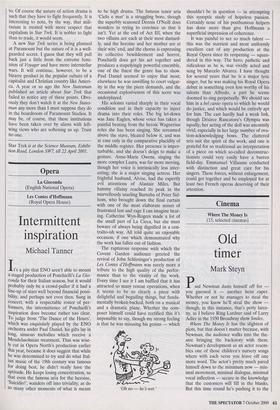Opera
La Gioconda (English National Opera) Les Contes d'Hoffmann (Royal Opera House)
Intermittent inspiration
Michael Tanner
It's a pity that ENO aren't able to mount a staged production of Ponchielli's La Gio- conda for their Italian season, but it would probably only be a crowd-puller if it had a line-up of stars well beyond financial possi- bility, and perhaps not even then. Sung in concert, with a respectable roster of per- formers, the intermittence of Ponchielli's inspiration does become rather too clear. To judge from 'The Dance of the Hours', which was exquisitely played by the ENO orchestra under Paul Daniel, his gifts lay in long, sinuous melodies which receive a Mendelssohnian treatment. That was wise- ly cut in Opera North's production earlier this year, because it does suggest that while he was determined to try and do what Ital- ian music of the 19th century was famous for doing best, he didn't really have the aptitude. He keeps losing concentration, so that even the famous aria for the heroine, `Suicidio!', wanders off into triviality, as do so many other moments of what is meant to be high drama. The famous tenor aria `Cielo e mar' is a straggling bore, though the superbly seasoned Dennis O'Neill does wonders in trying to convince us that it isn't. Yet at the end of Act III, when the two villains are each at their most dastard- ly, and the heroine and her mother are at their wits' end, and the chorus is expressing its collective bewilderment and horror, Ponchielli does get his act together and produces a stupefyingly powerful ensemble, one of the finest the genre has to show. Paul Daniel seemed to enjoy that most; elsewhere he was unwilling to court vulgar- ity in the way the piece demands, and the occasional explosiveness of this score was underplayed.
His soloists varied sharply in their vocal condition and in their capacity to inject drama into their roles. The big let-down was Jane Eaglen, whose voice has taken a painful beating from the heroic Wagnerian roles she has been singing. She screamed above the stave, bleated below it, and was at ease only in the comparative placidity of the middle register. Her presence is imper- turbable, and she doesn't deign to make a gesture. Anne-Marie Owens, singing the more complex Laura, was far more moving, though her voice is intrinsically less inter- esting; she is a major singing actress. Her frightful husband, Alvise, had the expertly evil attentions of Alastair Miles. But hammy villainy reached its peak in the marvellously snarling Barnaba of Peter Sid- hom, who brought down the final curtain with one of the most elaborate noises of frustrated lust and rage I can imagine hear- ing. Catherine Wyn-Rogers made a lot of the small part of La Cieca, but she must beware of always being dignified in a con- tralto-ish way. All told quite an enjoyable occasion, if one which demonstrated why the work has fallen out of fashion.
The rapturous response with which the Covent Garden audience greeted the revival of John Schlesinger's production of Les Contes d'Hoffmann was surely more a tribute to the high quality of the perfor- mance than to the vitality of the work. Every time I see it I am baffled that it has attracted so many rescue operations, when it seems to be so clearly a piece with delightful and beguiling things, but funda- mentally broken-backed, both on a musical and a dramatic plane. Whether the com- poser himself could have rectified this it's impossible to say, though my strong feeling is that he was misusing his genius — which 'Oh no — he's wet.' shouldn't be in question — in attempting this synoptic study of hopeless passion. Certainly none of his posthumous helpers has done more than give Hoffmann a superficial impression of coherence.
It was painful to see so much talent this was the starriest and most uniformly excellent cast of any production at the Royal Opera since its reopening — squan- dered in this way. The hero, pathetic and ridiculous as he is, was vividly acted and sung by Marcelo Alvarez. I have thought for several years that he is a major lyric singer, but he was making his Royal Opera debut in something even less worthy of his talents than Alfredo, a part he seems doomed to sing perpetually. We should see him in a bel canto opera to which he would do justice, and which would be entirely apt for him. The cast hardly had a weak link, though Desiree Rancatore's Olympia was squally; her acting of the doll was uncannily vivid, especially in her large number of ova- tion-acknowledging bows. The cluttered sets suit the spirit of the work, and one is grateful for so traditional an interpretation of a piece on which so-called deconstruc- tionists could very easily have a barren field-day. Emmanuel Villaume conducted with distinction and great care for his singers. These forces, without enlargement, could get together and be employed for at least two French operas deserving of their attention.


















































































 Previous page
Previous page